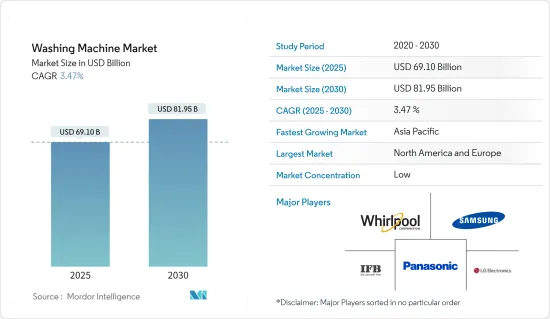PUBLISHER: Mordor Intelligence | PRODUCT CODE: 1636582

PUBLISHER: Mordor Intelligence | PRODUCT CODE: 1636582
Washing Machine - Market Share Analysis, Industry Trends & Statistics, Growth Forecasts (2025 - 2030)
The Washing Machine Market size is estimated at USD 69.10 billion in 2025, and is expected to reach USD 81.95 billion by 2030, at a CAGR of 3.47% during the forecast period (2025-2030).

The global washing machine market is experiencing steady growth, driven by increasing urbanization, rising disposable incomes, and changing consumer preferences for energy-efficient and technologically advanced appliances. Smart washing machines, featuring IoT connectivity, energy-saving modes, and customizable wash cycles, are becoming more popular as consumers prioritize convenience and sustainability. Additionally, the demand for smaller, high-efficiency models is increasing, catering to urban households with limited space, which further boosts the market.
However, despite this growth, the washing machine market faces challenges such as the high initial costs of advanced models, fluctuating raw material prices, and environmental concerns regarding water and energy consumption. Nevertheless, favorable government policies promoting energy-efficient appliances and opportunities for expansion into emerging markets allow manufacturers to reach a broader customer base. As brands continue to focus on innovation, automation, and eco-friendly designs, the market is expected to evolve further to meet the changing needs of consumers worldwide.
Washing Machine Market Trends
E-Commerce Revolutionizes Access to Smart Washing Machines
In the washing machine market, e-commerce has emerged as a pivotal force, granting consumers unmatched accessibility and convenience. Online platforms showcase a diverse array of washing machines, from smart and energy-efficient models to those integrated with IoT technology, addressing varied customer preferences. With tools like price comparisons, customer reviews, and virtual product demos, buyers are better equipped to make informed choices. Additionally, payment flexibility-through options like no-cost EMIs and pay-later schemes has rendered premium appliances more attainable, spurring increased adoption.
This momentum is further bolstered by e-commerce's reach into tier-II and tier-III cities, areas where offline retail may be sparse. With services like doorstep delivery and smooth installation, consumers enjoy a hassle-free experience. Exclusive online discounts and seasonal promotions further amplify sales. As digital transformation gains speed, e-commerce is poised to solidify its status as the primary distribution channel, steering the future of the washing machine market.
Urbanization In Asia Drives Demand for Compact Washing Machines
Manufacturers are developing compact, stackable, and multi-functional washing machines that maximize space efficiency without compromising performance. Many of these models combine washing and drying functions and offer flexible installation options to accommodate the growing urban populations in Asia, where space is often limited.
Additionally, consumers are increasingly seeking customization and premium features beyond basic washing capabilities. These features include advanced fabric care settings, steam cleaning, and quick wash cycles. High-end models typically showcase sleek designs, touchscreen controls, and smart home integration, enabling voice control and enhancing the overall user experience.
Washing Machine Industry Overview
The global washing machine market is highly fragmented, with many players competing across various regions. Key Players such as Whirlpool, SAMSUNG, LG Electronics, IFB Appliances and Panasonic Holdings Corporation dominate the maket by Utilizing strong brand recognition, advanced technology, a wide range of products, and global distribution networks.
Additional Benefits:
- The market estimate (ME) sheet in Excel format
- 3 months of analyst support
TABLE OF CONTENTS
1 INTRODUCTION
- 1.1 Study Assumptions and Market Definition
- 1.2 Scope of the Study
2 RESEARCH METHODOLOGY
3 EXECUTIVE SUMMARY
4 MARKET DYNAMICS
- 4.1 Market Overview
- 4.2 Market Drivers
- 4.2.1 Smart Home Technology Advancements Fuel Market Expansion
- 4.2.2 Energy and Water-Saving Washing Machines Boosting Market Demand
- 4.3 Market Restraints
- 4.3.1 Soaring Electricity Consumption Stunts Market Growth
- 4.3.2 Water Scarcity Poses Major Challenge to Market Expansion
- 4.4 Market Opportunities
- 4.4.1 Smart Washing Machines, Growing Opportunity in the Market
- 4.4.2 Expansion of Online Retail Channels
- 4.5 Value Chain / Supply Chain Analysis
- 4.6 Porters 5 Force Analysis
- 4.6.1 Threat of New Entrants
- 4.6.2 Bargaining Power of Buyers/Consumers
- 4.6.3 Bargaining Power of Suppliers
- 4.6.4 Threat of Substitute Products
- 4.6.5 Intensity of Competitive Rivalry
- 4.7 Insights on Technological Innovations in the Market
- 4.8 Impact of Covid-19 on the Market
5 MARKET SEGMENTATION
- 5.1 Product
- 5.1.1 Fully Automatic
- 5.1.2 Semi-Automatic
- 5.2 Technology
- 5.2.1 Smart Connected
- 5.2.2 Conventional
- 5.3 End User
- 5.3.1 Commercial
- 5.3.2 Residential
- 5.4 Application
- 5.4.1 Healthcare
- 5.4.2 Hospitality
- 5.4.3 Others
- 5.5 Sales Channel
- 5.5.1 E-Commerce
- 5.5.2 Retail Chains
- 5.5.3 Direct Sales
- 5.6 Geography
- 5.6.1 North America
- 5.6.1.1 United States
- 5.6.1.2 Canada
- 5.6.1.3 Rest of North America
- 5.6.2 Europe
- 5.6.2.1 United Kingdom
- 5.6.2.2 Germany
- 5.6.2.3 France
- 5.6.2.4 Italy
- 5.6.2.5 Spain
- 5.6.2.6 Rest of Europe
- 5.6.3 Asia-Pacific
- 5.6.3.1 India
- 5.6.3.2 China
- 5.6.3.3 Japan
- 5.6.3.4 Australia
- 5.6.3.5 Rest of Asia-Pacific
- 5.6.4 South America
- 5.6.4.1 Brazil
- 5.6.4.2 Argentina
- 5.6.4.3 Rest of South America
- 5.6.5 Middle-East and Africa
- 5.6.5.1 United Arab Emirates
- 5.6.5.2 South Africa
- 5.6.5.3 Rest of Middle-East and Africa
- 5.6.1 North America
6 COMPETITIVE LANDSCAPE
- 6.1 Market Concentration
- 6.2 Company Profiles
- 6.2.1 Whirlpool
- 6.2.2 SAMSUNG
- 6.2.3 LG Electronics
- 6.2.4 IFB Appliances
- 6.2.5 Panasonic Holdings Corporation
- 6.2.6 Haier Inc.
- 6.2.7 Toshiba Corporation
- 6.2.8 Godrej
- 6.2.9 GENERAL ELECTRIC COMPANY
- 6.2.10 AB Electrolux*
7 MARKET FUTURE TRENDS
8 DISCLAIMER AND ABOUT US




